Speak Up: PEN Community Talks Trump Transition
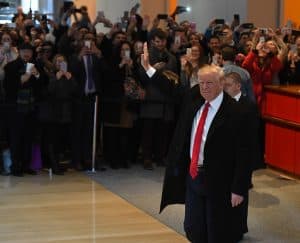
As part of PEN America’s ongoing coverage of the Trump transition, PEN America Member Jeff MacGregor offers his take on the daily goings on in Washington and on Fifth Ave. and what it all means for free expression in the U.S.
December 5, 2016
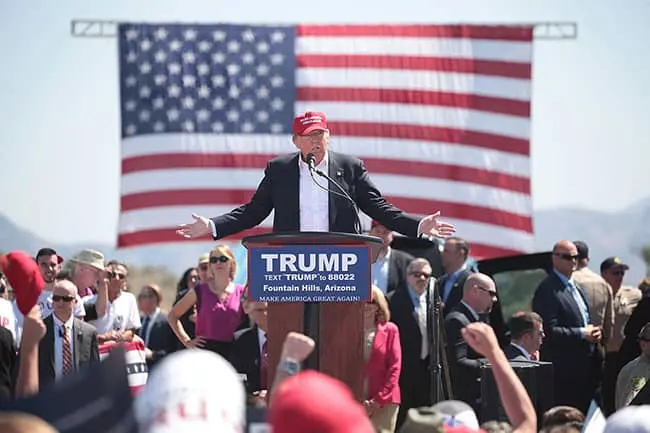
Want to know how to fight back?
Kurt Vonnegut said this about protests in the Vietnam Era.
When it became obvious what a dumb and cruel and spiritually and financially and militarily ruinous mistake our war in Vietnam was, every artist worth a damn in this country, every serious writer, painter, stand-up comedian, musician, actor and actress, you name it, came out against the thing. We formed what might be described as a laser beam of protest, with everybody aimed in the same direction, focused and intense. This weapon proved to have the power of a banana-cream pie three feet in diameter when dropped from a stepladder five-feet high.
So, due respect to the relevant parties, but your tepid sarcasm won’t cut it. In fact, it’s a boomerang that comes back to hit us right in the face. Free speech and a free press need better, sharper, smarter weapons.
Snark won’t save us. It’s what got us here. The condescension. The arch tone of dismissal. Exclusion. The eye-rolling. The ironic signaling to other ironists. How detached we are! How evolved! And how smart! How high above it all we fly!
Journalism doesn’t need more opinion pieces meant only for other journalists. We need more reporting. More clarity. More empathy. More understanding. We need to help our neighbors engage and act upon the rights and responsibilities of every citizen. The fate of the republic hangs in the balance.
We need to become missionaries on behalf of a democracy founded on honesty and fact.
December 2, 2016
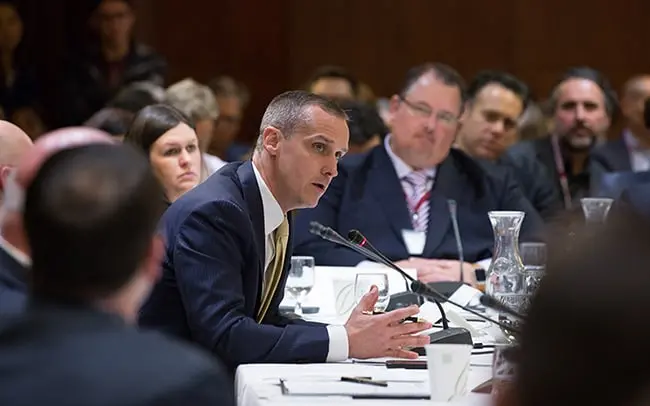
It’s hard to be an optimist.
If you thought the gratuitous attacks on the “extremely dishonest” American press ended with the campaign, think again. The assault continues.
More importantly, the war on objectivity, on a fact-based truth, is just beginning.
“The strangest criticism of the media, however,was by Trump’s former campaign manager, Corey Lewandowski. His complaint: Journalists accurately reported what Trump said. ‘This is the problem with the media. You guys took everything that Donald Trump said so literally,’ Lewandowski said. ‘The American people didn’t. They understood it. They understood that sometimes — when you have a conversation with people, whether it’s around the dinner table or at a bar — you’re going to say things, and sometimes you don’t have all the facts to back it up.’ ”
This is an argument in favor of fantasy. An argument on behalf of the fairy tale. An argument in service of fiction. It is the biggest lie of all, that nothing can be known, that nothing is a fact, that nothing is true. This is the worst kind of relativism. It proposes and endorses government by misdirection.
In order to survive in this parallel reality – in this Parallel America – the press needs to embrace its adversarial relationship to power. The press can only be hurt by its own complicity in the fiction.
What some folks want is the myth. The promise. The comforting lie. They’re about to get it.
But most people still want the truth; however hard or unvarnished. They want facts. They want reporting. They want the freedom to decide how to live and thrive in the world as we find it. They’ll need a vigorous and fair-minded press to do so. It is an essential part of self-governance, and of our American character, that we rise to meet the world as it is, not only as we imagine it to be.
Tuesday, November 29, 2016
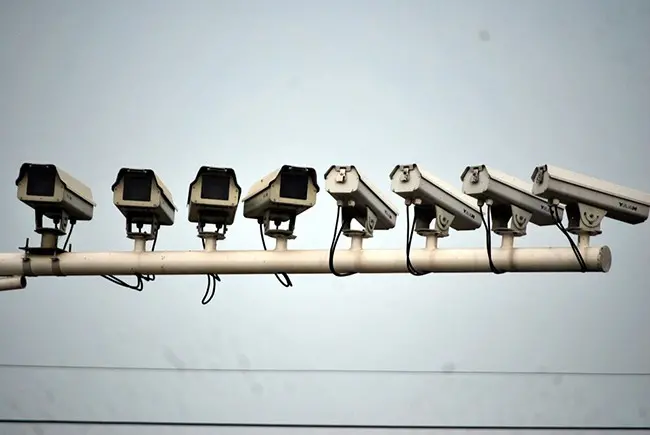
The fundamental tension in the American Experiment is that between the rights of the individual and the needs of the group. We call that group The State.
It is a complication of democracy that the interests of one are so often in conflict with the interests of the other.
Thus the news of more intrusive uses of government surveillance isn’t really news at all. It is merely the latest entry on the timeline of our national paranoia, which goes back to the founding. It is another in a series of attacks on free expression and freedom of thought going back to the Alien and Sedition Act of 1798.
“Electronic” surveillance began with the telegraph, and grew with the telephone. Wiretaps came into their own around the time of the Sedition Act of 1918 and were instrumental in the Palmer Raids of 1919 and 1920. Since then we’ve built a global network of satellites and fiber optic cables, cell phones and computers. Orders of magnitude more powerful and intrusive than anything J. Edgar Hoover ever dreamed of in his fevered sleep, the current apparatus for intelligence gathering at home and abroad is immense and pervasive.
And since September 12, 2001 we have willingly given up our rights and freedoms in service of an imaginary security.
Confronted with that wave of global violence and fear, in 2007 David Foster Wallace proposed a simple thought experiment. What if America chose not to fight a “war” on “terror?” What if some number of casualties was the cost of being free? What if we were all called upon to risk ourselves in a sacrifice not only on behalf of the state, but in defense of our independence?
Instead, we’ve built a black box police state kept in check only by the morality and ethical imperatives of its operators and a handful of whistleblowers. We’ve undertaken a war that cannot be won or even ended.
The FBI, the NSA, the CIA, the entire alphabet inventory of Washington’s surveillance bureaucracy can be used to suppress dissent at home. These institutions are political. They are weapons. They can be bent to the will of those in power. They can and will be used against us.
In its post-9/11 derangements, America must not be allowed to scare itself to death.
Tuesday, November 29, 2016
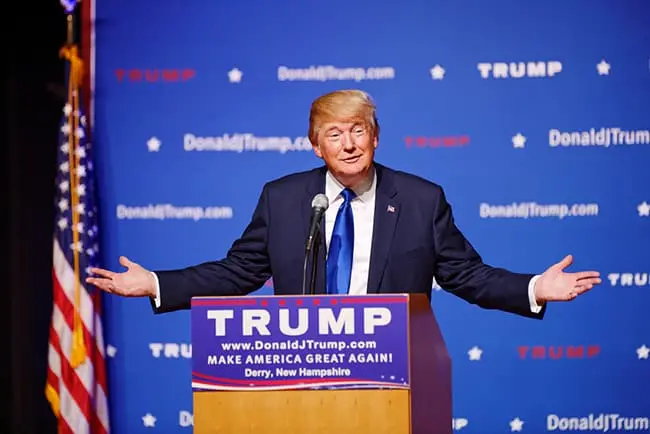
No one likes a sore winner.
But we wake to find this morning that our President-elect, soon to be the most powerful individual on the planet, has spent the night calling out not only the media, not only a single news organization, but individual members of the press. By name.
“. @CNN is so embarrassed by their total (100%) support of Hillary Clinton, and yet her loss in a landslide, that they don’t know what to do.”
He then retweets a series of posts directed at CNN’s Washington correspondent Jeff Zeleny.
“@sdcritic: @HighonHillcrest @jeffzeleny @CNN There is NO QUESTION THAT #voterfraud did take place, and in favor of #CorruptHillary !”
and
“@FiIibuster: @jeffzeleny Pathetic – you have no sufficient evidence that Donald Trump did not suffer from voter fraud, shame! Bad reporter.”
and
“@JoeBowman12: @jeffzeleny just another generic CNN part time wannabe journalist !” @CNN still doesn’t get it. They will never learn!”
and
“@HighonHillcrest: @jeffzeleny what PROOF do u have DonaldTrump did not suffer from millions of FRAUD votes? Journalist? Do your job! @CNN”
Then, just as you’re finishing your eggs, he throws the First Amendment out the window.
“Nobody should be allowed to burn the American flag – if they do, there must be consequences – perhaps loss of citizenship or year in jail!”
This sort of bullying, this sort of targeted intimidation is meant to chill dissent. Not only in the press, but on the streets as well.
We argue here at PEN American Center about the political nature of this blog. We are an organization devoted to free expression, free speech, free assembly and freedom of thought. We are activists on behalf of the 1st Amendment here in the United States, and on behalf of writers and thinkers everywhere.
These issues – free speech and a free press under attack by government – are by definition political, but they are not partisan. I take no side, except that of the Constitution and of our individual right to our own thoughts and the freedom to express them. But these are strange times.
The personal becomes the political. And governments, in good times and bad, reflect the strengths and weaknesses of the individuals who comprise them. Fear and ignorance and self-doubt will always seek to limit expression.
So we must ready ourselves.
The only true threat to our freedom will come from within.
Monday, November 28, 2016
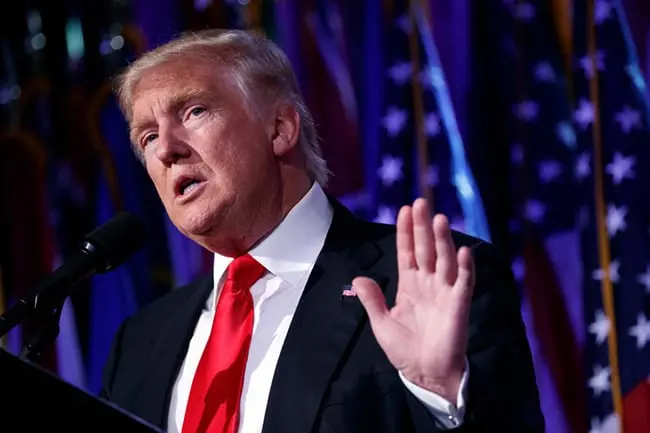
So. This,
“In addition to winning the Electoral College in a landslide, I won the popular vote if you deduct the millions of people who voted illegally.”
Tweeted on Sunday morning, and followed by this:
“Serious voter fraud in Virginia, New Hampshire and California – so why isn’t the media reporting on this? Serious bias – big problem!”
Tweeted on Sunday night, and is followed by this headline, “Trump Claims, With No Evidence, That ‘Millions of People’ Voted Illegally”, early Monday morning.
By midmorning, the claim, which began as a loosely sourced conspiracy theory, had been debunked here.
Misunderstanding? Misinformation? Disinformation?
Big problem!
Welcome to the Republic of Fiction, into which no truth intrudes, and from which no truth escapes. Does it really matter if a lie is strategic or tactical or pathological? The blurring of fact and fiction at the highest levels of government should terrify every journalist, because it makes our job impossible. It renders the gathering of evidence irrelevant. It undercuts every argument, and eventually flattens debate. In the absence of a national dialogue based on legitimate, fact-based points of view, all that matters is who holds megaphone.
It makes democracy impossible. In this case the fiction might have been meant to divert attention from a weekend’s worth of New York Times stories on the coming tidal wave of corruption, and why it matters. Or it might represent genuine confusion between the real and the imaginary. Or simply reveal hurt feelings.
In any case, tyranny depends upon ignorance. And the quickest way to ignorance is to grant equal weight to every assertion. To believe and then contradict every proposition. In the endless relativity of truth is stasis. Stalemate. Thus to the ruling class, the beginning of tyranny and its endgame is always the same: “Believe me when I say everything you read is a lie. I alone know the truth.”
Up is down. Down is up. Strength is weakness. In the darkest hour it then becomes the responsibility of every artist, every journalist and every poet, every writer everywhere to find and illuminate the truth. And to defend it.
Now more than ever, remember your Orwell.
Friday, November 25, 2016
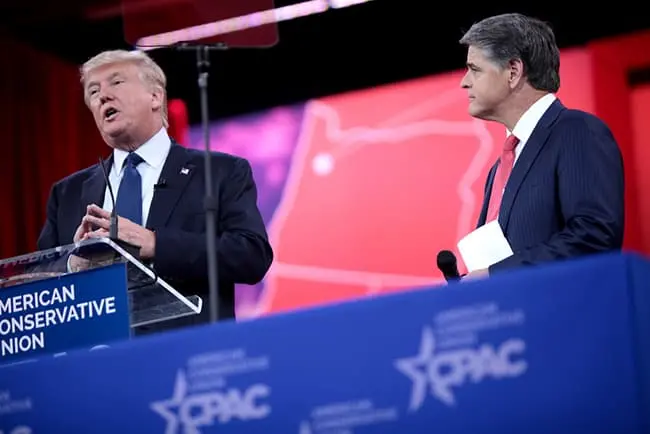
Just before Thanksgiving, talking haircut Sean Hannity summed up the troubles of the postmodern American press in a single tweet.
“@ politico @ CNN @ NBCNEWS @ CNBC @ msnbc @ nytimes @ ABC @ CBSNEWS Are all biased and Corrupt. “Fake News.” If I were @ realDonaldTrump NO ACCESS!”
A fake journalist at a fake news network points the finger at journalism and cries “Fake!”
This is the funhouse mirror of 21st century American media.
Mr. Hannity works for a television news operation likely to become both a megaphone and a stiletto for the incoming administration. It will do the wet work and dirty work of rumor distribution and character assassination. Earnest, fact-based journalism will be pursued at every anchorperson’s peril. Mr. Hannity’s job will be to service and sell the new government. A parade of right wing flameouts and rising stars will appear as guests on his show to help him do so.
Mr. Hannity takes great care to tell you he is not a journalist. Mr. Hannity is a courtier. A flatterer. He tells the emperor the new outfit looks terrific.
To the rest of us he sells fear and he sells ignorance. And in this era of misinformation, disinformation and propaganda, folks are buying.
For most of its history, journalism has been an expression of partisanship. Advocacy. It’s only in the last half-century or so that we’ve come to expect “objectivity”—a professionalized disinterest and dispassion in our news telling. So, just as there have always been rich and powerful publishers selling a particular brand of politics, a specific line of thinking, there have always been fake journalists—and for-profit pamphleteers, cynics and con artists, quislings and hacks and fellow travelers. Mr. Hannity is merely one of these, in an era thick with them.
Ann Coulter, Michelle Malkin, Laura Ingraham, Rush Limbaugh, Alex Jones, et al. are today’s update on Father Coughlin. They monetize hate and fear. There has always been a considerable business gulling the suckers and bilking the ignorant. There’s big money to be made keeping people frightened and angry. Cable television and the internet simply expand the fearmonger’s reach.
And for every action an equal and opposite reaction: The rise of fake news will be a bipartisan affair. Expect a great deal more of it on your social media feeds from the diehards and dead enders on the disaffected left in the years ahead.
Ironically it was the rollback of broadcasting’s equal time rules and the repeal of the Fairness Doctrine in support of a more robust First Amendment in the 1980s that led to our current glut of reactionary foghorns, alarmists and conspiracy cultists. Many of whom seek to muzzle or even destroy a disinterested, fair-minded press in order to line their own pockets.
Mr. Hannity, an actor, will never fight for your right to speak.
But real journalists must fight for his.
Wednesday, November 23, 2016
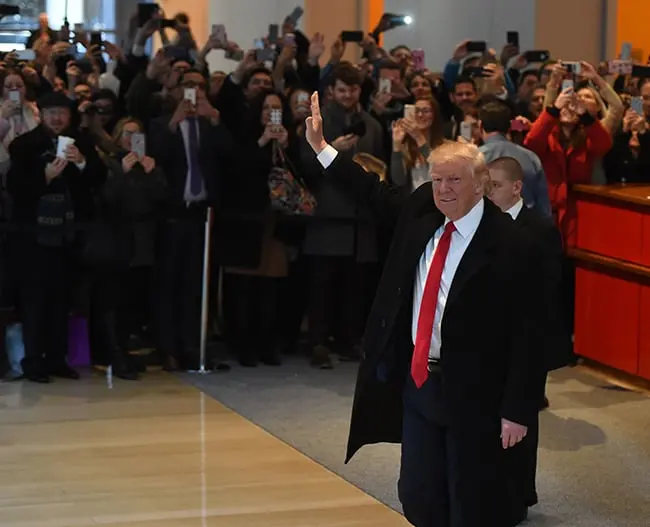
At the end of Tuesday’s belated interview at the New York Times, we read this:
MARK THOMPSON: Thank you, and it’s a really short one, but after all the talk about libel and libel laws, are you committed to the First Amendment, to the Constitution?
TRUMP: Oh, I was hoping he wasn’t going to say that. I think you’ll be happy. I think you’ll be happy. Actually, somebody said to me on that, they said, ‘You know, it’s a great idea, softening up those laws, but you may get sued a lot more.’ I said, ‘You know, you’re right, I never thought about that.’ I said, ‘You know, I have to start thinking about that.’ So, I, I think you’ll be O.K. I think you’re going to be fine.
SULZBERGER: Well, thank you very much for this. Really appreciate this.
TRUMP: Thank you all, very much, it’s a great honor. I will say, The Times is, it’s a great, great American jewel. A world jewel. And I hope we can all get along. We’re looking for the same thing, and I hope we can all get along well.
“I think you’ll be happy.” This is the newspaper the President-elect has been attacking for decades. “I think you’ll be happy.”
No one, least of all the man who said it, knows what that really means. And, as Stephen Colbert later tweeted, the threat doesn’t end after a single interaction with the New York Times newsroom.
“President Obama will pardon his last turkey tomorrow. But stay tuned for Thanksgiving 2017 when President Trump pardons a journalist.”
Gallows humor. But of all the disaster fantasies and catastrophe scenarios so far predicted, the first and most obvious will be the end of meaning. In fact the ethering of language is already underway.
Seriously, not literally. Literally, not seriously. Think of our President-elect as Eddie Haskell from Leave it to Beaver, someone who’ll say whatever he needs to say to be let off the hook when confronted by an adult. Now, more than ever, we need art and journalism that push back against situational “Who me?” ethics like these. And we’re going to need a great deal more than the press club passivity of the big media okey-doke.
The problems for journalists are obvious. How do you cover someone willing to say anything because they believe nothing? What happens to language disconnected from intention and belief? How do you cover an administration that says everything—and then its opposite—with equal conviction?
What do you call someone who doesn’t know he’s lying?
Wednesday, November 23, 2016
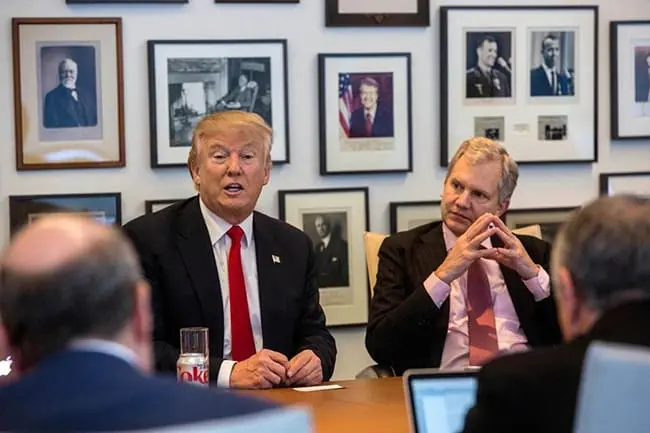
Reports of the off-the-record meeting between the President-elect and the heads and haircuts of the network news vary wildly. Depending upon which account you read it was a frank and civil exchange of ideas, or it was a firing squad.
The American press has a long tradition of off-the-record interviews with the president. It is part of the job, and part of the necessarily reciprocal nature of operating a democracy.
But the relationship between the press and the president is meant to be adversarial. The risk to us all is too great when corporate media become flatterers in order to maintain access; when self-censorship and shareholder imperatives might lead not only to “normalizing” but to “sanitizing.”
Now more than ever we need our journalism to be courageous and independent, and our journalists vigilant and straight-backed. Because the first casualty of watchdogs into lapdogs will be language. After which, the long slide into Orwellian unmeaning and a government untethered to any truth but its own. A feckless press is no better than a state-run press. Now is the time to stiffen our resolve.
Because by comforting the comfortable and afflicting the afflicted, corporate journalism will accelerate its own irrelevancy. And eventually, historically, thin-skinned strongmen are all too willing to cut out the middleman. “Donald Trump Cancels New York Times Meeting and Pursues Battles With the Press” reads the headline on the Times website this morning.
“I cancelled today’s meeting with the failing @nytimes when the terms and conditions of the meeting were changed at the last moment. Not nice” reads the PEOTUS tweet,
and
“Perhaps a new meeting will be set up with the @nytimes. In the meantime they continue to cover me inaccurately and with a nasty tone!” reads the next.
In fact, in this age of social media and direct marketing, why bother to wrestle the national news-gathering apparatus at all?
Instead of a press conference, a sales pitch, a two-and-a-half minute YouTube video. The wooden TelePrompter reading and the sentence fragments as familiar as the hollow slogans and the empty promise of imaginary excellence.
Expect more infomercials.
Buyer beware.
Tuesday, November 22, 2016
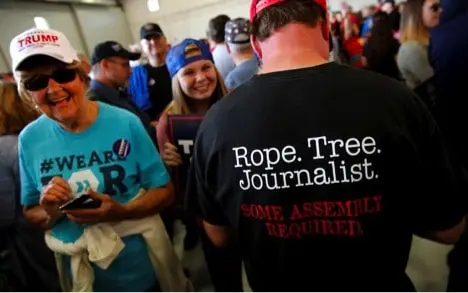
Maybe what’s surprising is how fast it happens. You wake up one morning in the fight of your life.
“I’m going to open up our libel laws so when they write purposely negative and horrible and false articles, we can sue them and win lots of money. We’re going to open up those libel laws. So that when The New York Times writes a hit piece, which is a total disgrace, or when The Washington Post, which is there for other reasons, writes a hit piece, we can sue them and win money instead of having no chance of winning because they’re totally protected. You see, with me, they’re not protected.” – Donald Trump
“Open up” libel law to hamstring a national press already weakened by technology, social media, and the failure of its business models; already under attack by the wealthy and secretive. Then tighten restrictions on peaceful protest (or inauguration day protests) and an adversarial relationship with an untrusting public inundated by disinformation and propaganda and insulated from dissent becomes the triumph of political fiction over hard and unattractive fact.
Suddenly, in a single presidential campaign cycle, everything we thought we knew about free expression and a free press, about free assembly and a free people, has changed. The effects on mainstream American journalism are already chilling. The most insidious of these are self-censorship and the slow transformation of language into unmeaning.
How we fight remains uncertain.
But symbols and slogans won’t be enough. We’ll need war chests and watchmen and an army of lawyers; money and fortitude and the phone number of every member of the United States Congress.
We are now at risk of joining the long list of poets and playwrights and journalists foreclosed, novelists and essayists and bloggers exiled. As PEN members, we’re used to fighting on behalf of our colleagues in Egypt, Iran and China, Russia and Turkey and Oman—anywhere repression is the rule of law.
What we’ve fought for decades and what we’re fighting now is vain, thin-skinned authoritarianism. Weakness. Violence. Everywhere different but everywhere the same, what we’re fighting is ignorance. Silence. Darkness. And now that fight comes home. The 1st Amendment is under siege.
You wake up one morning and everything’s at stake.
So donate. Organize. Act.
Rise and fight.
 Jeff MacGregor is a journalist in New York City. He has written for The New York Times, Sports Illustrated, the New Yorker, and Esquire.
Jeff MacGregor is a journalist in New York City. He has written for The New York Times, Sports Illustrated, the New Yorker, and Esquire.






